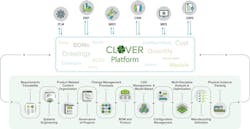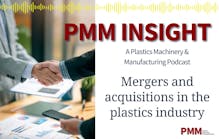By PMM Staff
German automaker Audi and chemical company LyondellBasell, headquartered in the Netherlands, have collaborated on a system for recycling automotive waste into plastic used in seatbelt buckle covers in Audi’s all-electric Q8 e-tron SUVs.
The companies announced last November that they developed a system that takes mixed automotive plastic waste from consumers’ vehicles at the end of life and turns it into a high-quality plastic that can be used in new car parts. The process involves dismantling automobiles, shredding the assorted plastics, and then using a chemical process to turn the old plastics into pyrolysis oil. The pyrolysis oil is then used as a raw material to produce new plastics, replacing virgin fossil feedstocks.
“As part of the PlasticLoop project, we are working with Audi to establish an innovative closed-loop process, recycling plastic automotive parts for use in new vehicles,” Eric Licht, new business development director for LyondellBasell’s Advanced Polymer Solutions EU, said in a press release. “For the first time, we are using chemical recycling to recycle mixed automotive plastic waste into plastic granulate for automotive interior applications.”
Plastics used in automobiles must meet exacting safety, heat resistance and quality requirements, according to a statement from Audi. That is why in the past only petroleum-based materials have been suitable for making plastic components in automobiles that are subjected to intensive wear.
With this new process, LyondellBasell, Audi and chemical recycler SynCycle are recycling a material that traditionally was used for energy recovery, according to the companies. This reduces the use of fossil-based primary materials for the Audi Q8 e-tron. Materials produced from pyrolysis oil are of the same high quality as virgin materials and have the same properties, according to a press release from the companies.
“Audi’s vision is to use secondary materials wherever it is technically possible, economically viable, and ecologically beneficial,” Philipp Eder, project manager for Circular Economy in the Supply Chain at Audi, said in a press release.
LyondellBasell’s polymer product (including fillers and additives) is manufactured through chemical recycling using 70 percent recycled content by weight. The recycled content is allocated by a mass balance method and validated by an independent certification body, ecoloop, according to LyondellBasell.






